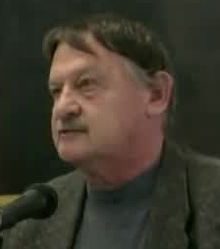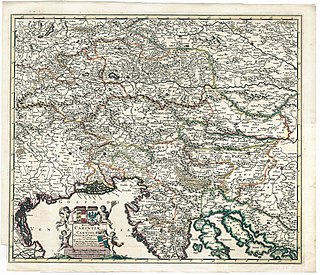
The history of Slovenia chronicles the period of the Slovenian territory from the 5th century BC to the present. In the Early Bronze Age, Proto-Illyrian tribes settled an area stretching from present-day Albania to the city of Trieste. The Slovenian territory was part of the Roman Empire, and it was devastated by the Migration Period's incursions during late Antiquity and the Early Middle Ages. The main route from the Pannonian plain to Italy ran through present-day Slovenia. Alpine Slavs, ancestors of modern-day Slovenians, settled the area in the late 6th Century AD. The Holy Roman Empire controlled the land for nearly 1,000 years, and between the mid-14th century and 1918 most of Slovenia was under Habsburg rule. In 1918, most Slovene territory became part of the Kingdom of Serbs, Croats, and Slovenes, and in 1929 the Drava Banovina was created within the Kingdom of Yugoslavia with its capital in Ljubljana, corresponding to Slovenian-majority territories within the state. The Socialist Republic of Slovenia was created in 1945 as part of federal Yugoslavia. Slovenia gained its independence from Yugoslavia in June 1991, and today it is a member of the European Union and NATO.
The politics of Slovenia takes place in a framework of a parliamentary representative democratic republic, whereby the Prime Minister of Slovenia is the head of government, and of a multi-party system. Executive power is exercised by the Government of Slovenia. Legislative power is vested in the National Assembly and in minor part in the National Council. The judiciary of Slovenia is independent of the executive and the legislature. Slovenia is a Member State of the European Union and is represented in the Council of the EU and through elections to the European Parliament.

Janez Drnovšek was a Slovenian liberal politician, President of the Presidency of Yugoslavia (1989–1990), Prime Minister of Slovenia and President of Slovenia (2002–2007).

The Social Democrats is a centre-left and pro-European social-democratic political party in Slovenia led by Tanja Fajon. From 1993 until 2005, the party was known as the United List of Social Democrats. It is the successor of the League of Communists of Slovenia. As of 2022, the party is a member of a three-party coalition government with Robert Golob's Freedom Movement alongside The Left, as well as a full member of the Party of European Socialists and Progressive Alliance.

The Democratic Party of Pensioners of Slovenia is a political party in Slovenia led by Ljubo Jasnič. The party claims broadly liberal values with a strong focus on the interests of the retired and the elderly. Despite being part of virtually every governmental coalition of Slovenia since it started appearing on voting ballots, the party only secured 0.66% of all votes at the most recent Slovenian parliamentary election in 2022 and thus failed to secure any seats in the National Assembly.
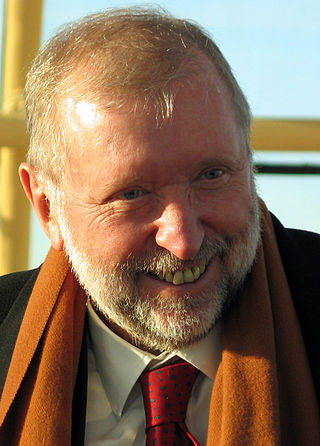
Dimitrij Rupel is a Slovenian politician.
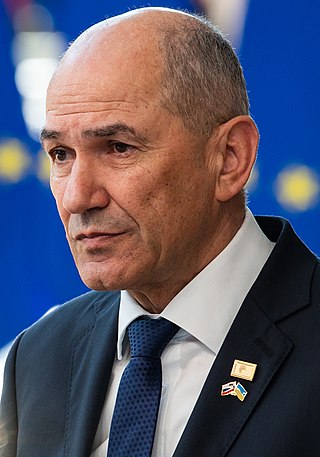
Ivan Janša, baptized and best known as Janez Janša, is a Slovenian politician and strongman who served three times as a prime minister of Slovenia, a position he had held from 2004 to 2008, from 2012 to 2013, and from 2020 to 2022. Since 1993, Janša has led the Slovenian Democratic Party, which has emerged as the pre-eminent Slovenian conservative party. Janša lost his fourth bid for prime minister in April 2022, his party defeated by the Freedom Movement party.

Borut Pahor is a Slovenian politician who served as President of Slovenia from 2012 to 2022. He previously served as Prime Minister of Slovenia from November 2008 to February 2012.

Jože Pučnik was a Slovenian public intellectual, sociologist and politician. During the communist regime of Josip Broz Tito, he was one of the most outspoken Slovenian critics of dictatorship and lack of civil liberties in SFR Yugoslavia.

Rastko Močnik is a Slovenian sociologist, psychoanalyst, literary theorist, translator and political activist. Together with Slavoj Žižek and Mladen Dolar, he is considered one of the co-founders of the Ljubljana school of psychoanalysis.

Milan Zver is a Slovenian politician and Member of the European Parliament (MEP) from Slovenia. He is a member of the Slovenian Democratic Party, part of the European People's Party. He is the Vice-President of the Slovenian Democratic Party. He served as Minister of Education and Sports from 2004 to 2008.
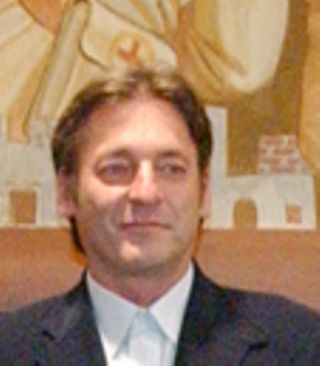
Vasko Simoniti is a Slovenian historian and politician. Between 2004 and 2008, he served as the Minister of Culture of Slovenia, being reappointed in 2020. He is an active member of the Slovenian Democratic Party.
Gregor Tomc also known as Grega Tomc is a Slovenian sociologist, musician and activist. In the late 1970s and 1980s, he was the founder and member of the Slovenian punk rock band Pankrti.
The Slovenian Democratic Union was a Slovene liberal political party, active between 1989 and 1991, during the democratization and the secession of the Republic of Slovenia from Yugoslavia.
Contributions to the Slovene National Program, also known as Nova revija 57 or 57th edition of Nova revija was a special issue of the Slovene opposition intellectual journal Nova revija, published in January 1987. It contained 16 articles by non-Communist and anti-Communist dissidents in the Socialist Republic of Slovenia, discussing the possibilities and conditions for the democratization of Slovenia and the achievement of full sovereignty. It was issued as a reaction to the Memorandum of the Serbian Academy of Sciences and Arts and to the rising centralist aspirations within the Communist Party of Yugoslavia.
The Committee for the Defence of Human Rights was a civil society organization in Slovenia, which functioned during the so-called Slovenian Spring between 1988 and 1990.

Igor Bavčar is a Slovenian politician and manager. He rose to prominence during the Slovenian spring, when he served as chairman of the Committee for the Defence of Human Rights, the largest independent civil society movement in the Socialist Republic of Slovenia. He was the Slovenian Minister of Interior during the Slovenian war of independence in June 1991, and coordinated Slovenian defence forces together with the Minister of Defence Janez Janša. He remained one of the most influential political figures in Slovenia until 1992, and remained an important member of the political establishment until 2002, when he left politics to engage in the private sector.
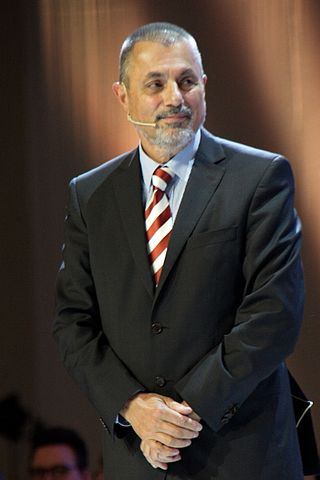
Peter Jambrek is a Slovenian sociologist, jurist, politician and intellectual. He is considered among the fathers of the current Slovenian Constitution and among the most influential public intellectuals in Slovenia.
Spomenka Hribar is a Slovenian author, philosopher, sociologist, politician, columnist, and public intellectual. She was one of the most influential Slovenian intellectuals in the 1980s, and was frequently called "the First Lady of Slovenian Democratic Opposition", and "the Voice of Slovenian Spring" She is married to the Slovenian Heideggerian philosopher Tine Hribar.
Nova revija is a Slovene language literary magazine published in Slovenia.
